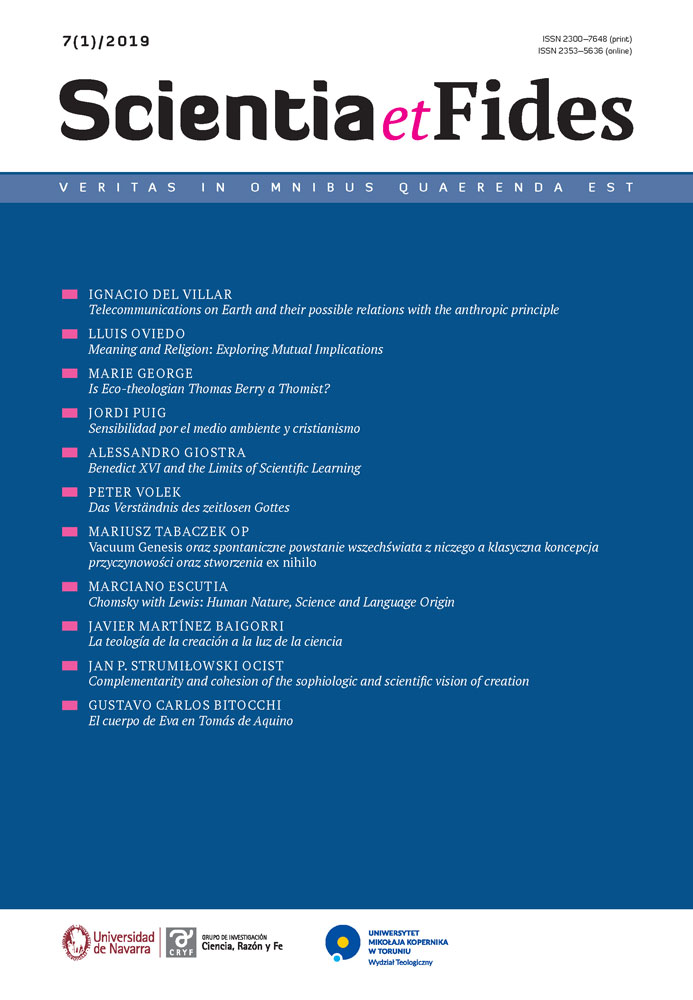Das Verständnis des zeitlosen Gottes
Keywords
eternity of God, divine timelessness, divine temporality, factual knowledge, propositional knowledgeAbstract
The Understanding of Timeless God
Eternity is one of the main properties of God. It can be understood either classically as timelessness, or as temporality in the modern understanding. One of the main objections against divine timelessness holds that a timeless God cannot act in the world; thus he cannot even create, or sustain the universe in existence. The reasons for such statements are that a timeless God cannot know what in the world happens earlier or later, and he cannot know what events are past, present, and future. Timeless God is supposed to only possess factual knowledge; he would have no propositional knowledge, as we humans have it. Against this, it could be argued that while God has only factual knowledge, he can still know what humans know through his insight into their consciousness in his essence. Direct knowledge of God is factual, but indirectly he can know propositional knowledge through his knowledge of human time experience, which is a part of human propositional knowledge. This way God can know time experience of individual humans, but he is knowing this, in his consciousness. The objection against the possibility of a timeless God’s acting within the world through creation and sustenance, and hence against the timeless understanding of God, is thus refuted.
References
Anselm von Canterbury. 1984. De concordia praescientiae et praedestinationis et gratiae Dei cum libero arbitrio. In: Opera omnia, edited by Franciscus Salesius Schmitt. Stuttgart – Bad Canstatt: Frommann-Holzboog, T. I, Vol. II, VI, 243–288.
Ariotti, Piero. 1972. “Celestial Reductionism of Time. On the Scholastic Conception of Time from Albert the Great and Thomas Aquinas to the End of the 16th Century.” Studi Internazionali di Filosofia 4: 91–120.
Craig, William Lane. 2001. God, Time, and Eternity. Dordrecht: Kluwer.
Čapek, Milič. 1987. “The Conflict between the Absolutist and the Relational Theory of Time before Newton.” Journal of the History of the Ideas 48: 595–608.
Deasy, Daniel. 2015. The moving spotlight theory. Philosophical Studies 172: 2073–2089.
De Florio, Ciro, and Frigerio, Aldo. 2017. “A Note in Eternity.” Topoi 36: 685–692.
Fine, Kit. 2005. Modality and Tense. Oxford: Oxford University Press.
Flasch, Kurt. 1989. Aufklärung im Mittelalter? Die Verurteilung von 1277. Das Dokument des Bischofs von Paris. Mainz: Dieterich.
Gredt, Joseph. 1935. Die aristotelisch-thomistische Philosophie. Bd. 1–2. Freiburg i. Br.: Herder.
Hallamaa, Olli. 2011. “Nicholas Oresme.” In Encyclopedia of Medieval Philosophy. Philosophy between 500 and 1500, Vol. 2: M–Z, edited by Henrik Lagerlund. Dordrecht: Springer, 884–889.
Hasker, William. 1989. God, Time, and Knowledge. Ithaca: Cornell University Press.
Helm, Paul. 1988. Eternal God. Oxford: Clarendon Press.
Leftow, Brian. 1991. Time and Eternity. Ithaca – London: Cornell University Press.
Lewis, Neil. 2003. “Space and Time.” In The Cambridge Companion to Duns Scotus, edited by Thomas Williams. Cambridge: Cambridge University Press, 69–99.
Lubin, Dean. 2016. “Can a Timeless God Act in the World?” Open Journal of Philosophy 6: 29–35.
Massie, Pascal. 2006. “Time and Contingency in Duns Scotus.” The Saint Anselm Journal 3: 17–31.
McTaggart, John M. E. 1908. “The Unreality of time.” Mind 17: 457–474.
Moser, Robbie. 2011. “Thomas Aquinas, Esse Intentionale, and the cognitive as such.” The Review of Metaphysics 64: 763–788.
Mullins, Ryan T. 2011–2012. “Time and the Everlasting God.” Pittsburgh Theological Journal 3: 38–56.
Mullins, Ryan T. 2014. “Doing Hard Time. Is God the Prisoner of the Oldest Dimension?” Journal of Analytical Theology, 2: 160–185.
Mullins, R. T. 2016. The End of the Timeless God. Oxford: Oxford University Press.
Prior, A. N. 1962. “The Formalities in Omniscience.” Philosophy 37: 114–129.
Sousedík, Stanislav. 2015a. “Towards a Thomistic theory of Intentional (‘Fictive’) Individuals (I).” Acta Universitatis Carolinae Theologica 5: 133–152.
Sousedík, Stanislav. 2015b. “Towards a Thomistic theory of Intentional (‘Fictive’) Individuals (II).” Acta Universitatis Carolinae Theologica 5: 253–257.
Stump, Eleonore, and Kretzmann, Norman. 1981. “Eternity.“ The Journal of Philosophy 78: 429–458.
Stump, Eleonore, and Kretzmann, Norman. 1987. “Atemporal Duration.” The Journal of Philosophy 84: 214–219.
Suárez, Francisco. 2009. “Disputationes metaphysicae.” Vol 1–2. Hildesheim: Olms.
Swinburne, Richard. 1977. The Coherence of Theism. Oxford: Clarendon Press.
Tapp, Christian. 2017. „Ewigkeit Gottes. Analytische Perspektiven.” In: Handbuch für Analytische Theologie, hg. von Gasser, Georg, Jaskolla, Ludwig, Schärtl, Thomas. Münster: Aschendorff, 363–402.
Thomas von Aquin. 1888. Summa Theologiae. In: Opera omnia iussu impensaque Leonis XIII P. M. edita. Tomus IV. Romae: Ex Typographia Polyglotta S. C. De Propaganda Fide. (STh)
Wittgenstein, Ludwig. 1984. Tractatus logico-philosophicus. Werkausgabe, Bd. 1. Frankfurt am Main: Suhrkamp.
Volek, Peter. 2018. „Ako možno chápať bezčasového Boha.“ [How Is It Possible the Understanding of Timeless God] Studia Aloisiana 9: 39–50.
Downloads
Published
How to Cite
Issue
Section
License
CC BY ND 4.0. The Creator/Contributor is the Licensor, who grants the Licensee a non-exclusive license to use the Work on the fields indicated in the License Agreement.
- The Licensor grants the Licensee a non-exclusive license to use the Work/related rights item specified in § 1 within the following fields: a) recording of Work/related rights item; b) reproduction (multiplication) of Work/related rights item in print and digital technology (e-book, audiobook); c) placing the copies of the multiplied Work/related rights item on the market; d) entering the Work/related rights item to computer memory; e) distribution of the work in electronic version in the open access form on the basis of Creative Commons license (CC BY-ND 3.0) via the digital platform of the Nicolaus Copernicus University Press and file repository of the Nicolaus Copernicus University.
- Usage of the recorded Work by the Licensee within the above fields is not restricted by time, numbers or territory.
- The Licensor grants the license for the Work/related rights item to the Licensee free of charge and for an unspecified period of time.
FULL TEXT License Agreement
Stats
Number of views and downloads: 858
Number of citations: 1



